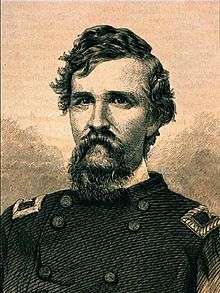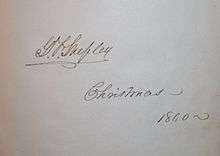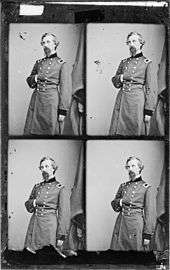George Foster Shepley (Maine and Louisiana)
| George Shepley | |
|---|---|
 | |
| Judge of the United States Circuit Court for the First Circuit | |
|
In office December 22, 1869 – July 20, 1878 | |
| Appointed by | Ulysses Grant |
| Preceded by | Seat established |
| Succeeded by | John Lowell |
| Military Governor of Richmond | |
|
In office April 3, 1865 – July 3, 1865 | |
| Preceded by | Joseph Mayo (Mayor) |
| Succeeded by | David Saunders (Mayor) |
| Governor of Louisiana | |
|
In office July 2, 1862 – March 4, 1864 | |
| Preceded by | Thomas Moore |
| Succeeded by | Michael Hahn |
| Mayor of New Orleans Acting | |
|
In office May 20, 1862 – July 11, 1862 | |
| Preceded by | John Monroe |
| Succeeded by | Godfrey Weitzel (Acting) |
| Personal details | |
| Born |
January 1, 1819 Saco, Maine |
| Died |
July 20, 1878 (aged 59) Portland, Maine |
| Political party |
Democratic (1848–1854) Republican (1854–1878) |
| Spouse(s) | Lucy Ann Hayes |
| Alma mater |
Harvard University Dartmouth College |

George Foster Shepley (January 1, 1819 – July 20, 1878) was a general in the Union Army during the American Civil War. He was appointed military and 18th Governor of Louisiana by General Benjamin Butler in June 1862. He later served as a United States federal judge.
Education and early career
Born in Saco, Maine, Shepley studied law at Harvard University, and then received an A.B. from Dartmouth College in 1837.[1] He read law and was admitted to the bar in 1839. He began the practice of law the same year, and was in private practice in Bangor, Maine from 1839 to 1844 and in Portland, Maine from 1844 to 1861. He was a U.S. Attorney for the District of Maine from 1848 to 1849 and from 1853 to 1861.
Military career

Shepley joined the army in November 1861 as a colonel of the 12th Maine Volunteer Infantry Regiment. He served as the acting military mayor of New Orleans from May 20, 1862 – July 11, 1862. This appointment lasted less than two months before Shepley was appointed military governor of the occupied parishes of Louisiana from 1862–1864, with the rank of brigadier general. Shepley later served as the first military governor of Richmond, Virginia, the Confederate capital.
Post-war legal and judicial career
After the war, Shepley returned to his private practice in Portland in 1865. He was a member of the Maine House of Representatives from 1866 to 1867, and continued in private practice until 1869. On December 8, 1869, Shepley was nominated by President Ulysses S. Grant to a new seat on the United States circuit court for the First Circuit created by 16 Stat. 44. He was confirmed by the United States Senate on December 22, 1869, and received his commission the same day. He continued in that office until his death.
He died in Portland, Maine, on July 20, 1878, and is interred at Evergreen Cemetery in that city. His tombstone has his birth date as January 1, 1819.[2]
See also
References
- ↑ Tucker, Spencer C. (2013). American Civil War: The Definitive Encyclopedia and Document Collection [6 volumes]: The Definitive Encyclopedia and Document Collection. ABC-CLIO. p. 1761.
- ↑ Appleton's Cyclopedia "George Foster Shepley"
- State of Louisiana - Biography
- Cemetery Memorial by La-Cemeteries
- George Foster Shepley at the Biographical Directory of Federal Judges, a public domain publication of the Federal Judicial Center.
External links
- "George Foster Shepley". Find a Grave. Retrieved 2008-10-13.
| Political offices | ||
|---|---|---|
| Preceded by John Monroe |
Mayor of New Orleans Acting 1862 |
Succeeded by Godfrey Weitzel Acting |
| Preceded by Thomas Moore |
Governor of Louisiana 1862–1864 |
Succeeded by Michael Hahn |
| Preceded by Joseph Mayo as Mayor of Richmond |
Military Governor of Richmond 1865 |
Succeeded by David Saunders as Mayor of Richmond |
| Legal offices | ||
| New seat | Judge of the United States Circuit Court for the First Circuit 1869–1878 |
Succeeded by John Lowell |
